World’s Columbian Exposition celebrated “American Cities Day” on Saturday, October 28, 1893, two days before the close of the Fair. Chicago’s Mayor, Carter Harrison, hosted what was thought to be the largest congregation of U.S. mayors ever assembled. Greeting the guests as they arrived on the fairgrounds on the bitterly cold day was the blast of a cannon and musical fanfares from a group of sixteen trumpeters stationed around Music Hall.
Mayors represented the great cities of Philadelphia, Milwaukee, San Francisco and New Orleans. Others came from smaller cities such as Rochester, New York, and Mount Vernon, Ohio, from Eau Claire, Wisconsin, and Chattanooga, Tennessee. Eric Larson notes in his best-seller Devil in the White City that “the record is silent as to whether New York’s mayor attended or not.” Mayor Thomas Gilroy of New York was not in Chicago for this meeting of mayors, but he had just the previous weekend visited Mayor Harrison in Chicago and attended the Fair for Manhattan Day on October 21, 1893.
After the festivities on the fairgrounds and his day of glory, Mayor Harrison returned home. That evening, deranged office-seeker Patrick Eugene Prendergast fatally shot the mayor in his home. Just hours earlier, Harrison had proclaimed that he intended “to live for more than half a century.”
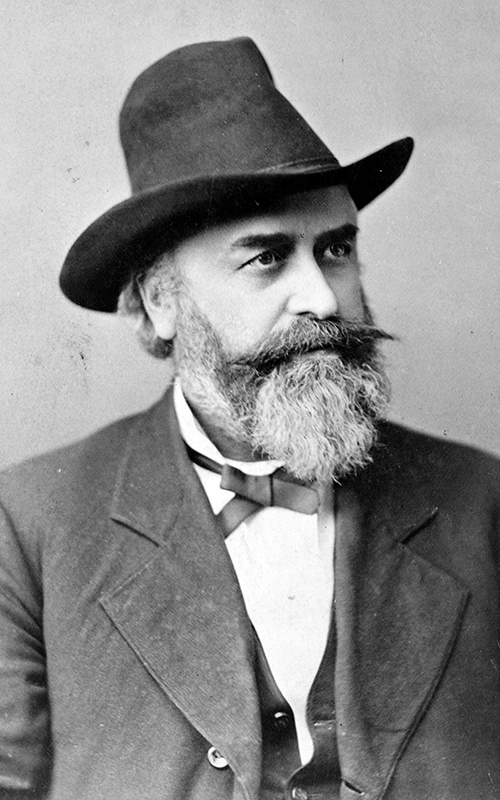
Reprinted below are two newspaper reports on Carter Harrison’s last speech. The first article (“Spoke for Liberty”) comes from the October 30, 1893, issue of the Chicago Herald. The story describes the scene before and after the mayor’s address, which the reporter records “was not preserved save in the memory of those present.” The second article shows this to not be true.
This excerpt from the October 30, 1893, issue of Chicago Daily Tribune (“His Last Address”) provides a transcript of Mayor Harrison’s “American Cities Day” speech. The Herald’s description of Harrison’s words being “extemporaneous” rings true. Speaking with sincere enthusiasm for the Columbian Exposition, Harrison bloviates about his civic pride in his city and sadness that Chicago’s fair will come to an end.
Both articles point out an important cause that Mayor Harrison worked on during his final days: a second year for the Columbian Exposition. Harrison and others were agitating for Congressional funding to re-open the Fair in Chicago in 1894. This position put Harrison in opposition to the Columbian Exposition Corporation, which was ready to close the books on the Fair, and Director of Works Daniel Burnham, whose plan for the White City was to “put the torch to it and burn it down.” Harrison can’t help but take a dig at Burnham in his speech by complimenting the late architect John Root, “who is really the designer of this thing.”
SPOKE FOR LIBERTY
Standing on the platform by the side of the Columbian Liberty Bell, his left hand grasping the red, white and blue cord with which he sent the clear notes ringing out on the crisp and frosty air, Carter H. Harrison made the last speech that ever fell from his lips on Saturday last. It was at high noon, just as Old Sol had reached the zenith and his yellow rays fell gratefully on the assembled Mayors from almost all the prominent cities in the union, who stood in mufflers and wraps of all kinds and braved the cold, biting winds that blew from the lake.
It was a brief speech that the mayor made, but those who heard the words that fell so spontaneously from his lips, say that never had he been so eloquent, so poetical, so brimming over with happy allusions and sparkling epigram. The speech was not preserved save in the memory of those present. They will never forget it nor the tragic event which followed so closely after.
It is a strange coincidence that Carter Harrison’s last speech should have been at the Liberty Bell, where, on previous occasions, he had delivered probably the two greatest speeches in all his long and eventful career. Mr. Harrison had been invited to deliver the farewell message to the white city, which he did Saturday morning. After this address he was to bid godspeed to the Liberty Bell.
At noon Saturday the bell was to peal out its clarion message of liberty in honor of the visiting heads of the American cities. Aldermen Madden and Kerr, the committee on arrangements, had been delegated to pull the tricolored cord that was to set the bell ringing. Twelve o’clock came, but Alderman Madden had not arrived. The party stood expectantly around the platform awaiting patiently his arrival. They stamped their feet upon the hard ground to keep warm, but despite the exercise nearly everyone in the party carried a red nose and blue lips as proof of what Old Boreas and his imps can do when they are in earnest.
Mayor Harrison was the jolliest person in all that vast -crowd. He seemed to be in particularly buoyant spirits and laughed and joked with his brother mayors. So infectious were his jollity and good-natured banterings that the entire party caught the spirit, and it was remarked more than once that the gathering was more like a party of school boys on a picnic than an assemblage of the most distinguished heads of the greatest American cities.
After waiting about ten minutes, as Alderman Madden had not put in an appearance, Mayor Harrison, turning to his associates, held up his hand, and in a cheery voice, full of enthusiasm, shouted: “Why can’t we all ring the Liberty Bell?”
Caught the Enthusiasm.
The effect was magical. The crowd caught the enthusiasm of the moment, and rushed pell mell toward the oak scaffolding where hung the bell. The Mayor and Alderman Kerr lead them. Following close on their heels were Mayor Stewart, of Philadelphia, Mayor Bemis, of Omaha, and Mayor Fitzpatrick, of New Orleans.
Before the ringing of the bell, however, Mayor Harrison made his last speech upon earth. Standing on the bell-frame, the crisp wind waving his grizzled locks, he uttered such sentiments as were fitting to the occasion. He spoke eloquently of the message of the bell and of the trip which it will make around the world. The audience were charmed with the flow of oratory and, in conclusion, as he bid the bell “God Speed,” they burst into a storm of cheers.
As the mayor concluded he pulled the cord and the glad notes rang out on the air. All of the visiting mayors lent a hand in the ringing of the bell. After the last note had trembled away the mayor cut the red, white and blue cord into bits, presented each Mayor with a memento, and divided the remainder among the ladies and children present. The gay party then dispersed. Little did they dream, as they joked and chatted, what the night would bring forth.
The last speech of Mayor Harrison being on the platform of the Liberty Bell recalls to mind his great speech at the same spot on the Fourth of July. It was at the time when the old flag of Paul Jones was hoisted and its faded folds flapped in the gentle breeze that wafted from the lake. It was perhaps the most dramatic scene any of those men and women who surged around the plaza ever gazed upon.
…
That was [his] second speech the bell. His third speech last Saturday was at the same spot. It was his last extemporaneous effort. When he climbed down the steps and bowed to the cheering auditors he was never to look upon an enthusiastic, expectant and eager audience again. He had given Chicago’s farewell message to the white city, the farewell message to the bell
of liberty and at the same time bidden farewell to Chicago, the city he loved so well and over which he ruled so many years.
After his speech at the Liberty Bell last Saturday Mr. Harrison spent nearly four hours wandering through the white city. With a friend, Harry Raymond, of South Park Avenue, he left the Liberty Bell and walked over to the Manufactures Building. He went first to the Russian exhibit, where he spent much time admiring the bronzes. He then went to Tiffany’s, where Manager Wakefield showed him everything of interest. While in this place, Mayor Harrison wrote his name, probably for the last time on this earth. Mr. Wakefield asked him to write in his autograph album. The mayor did as requested, and signed as follows:
CARTER H. HARRISON
Mayor’s Office
Oct. 28, 1893
Leaving Tiffany’s the mayor and his friend wandered into the Britannia and Meriden exhibits. At both places he was presented with souvenir spoons. After lunch he visited the Italian exhibit, in which he expressed himself as much interested. He seemed elated over his speech at the bell and told Mr. Raymond he thought he never made a better effort. He also said that he hoped Congress would be able to extend the fair another year; that he had visited it twenty times, but that was not half enough. At 3:40 the mayor complained of fatigue and left the fair grounds for his home.
HIS LAST ADDRESS
CARTER HARRISON TALKS TO THE
AMERICAN MAYORS
Mayors of the Various Cities Who Are Our Guests, and You, Officials of Chicago, and of Other Cities: It is my pleasing duty to welcome you to Chicago to witness the dying scene of this magnificent Exposition. It is a little chilly in weather, but the sun is coming out, and you have a warm beat from the heart of our people. Thus it is that at the dying scene, while these beauties are passing away, this World’s Fair is showing itself in its most majestic proportion, as the moment approaches for it to pass away forever.
Mr. Madden has said to you words of praise of the efforts of our sister cities in helping to make this thing a success. All who have visited the World’s Fair are glad of the opportunity they have had to see such a scene of grandeur, and I myself deeply pity any American who has lost the opportunity of coming here.
I have sometimes said what I would do if I were President of the United States. If I were today Grover Cleveland I would send a message to Congress and would say in that message that the World’s Columbian Exposition has been a success, aye, beyond the expectation of any man living. It was fitting for us to celebrate the greatest event of the world, the discovery of two continents. Six months has been altogether too short a time for this greatest of all world’s fairs. The President should say that it has beaten itself and the American people should today make an appropriation through its Congress to preserve these buildings until next year and notify all the world to come here.
At the end of this week we shall have had 22,000,000 admissions to these grounds. No doubt many of them have been duplicated many times. There have probably been 10,000,000 or 12,000,000 of Americans inside these grounds. We have in the United States 65,000,000, aye, nearly 70,000,000 inhabitants, and the Congress should declare that another year be given us that all Americans could have an opportunity to come here. The Exposition, the directory, has not the means to continue it. It is a national enterprise and the nation should breathe new life into it and let us have the Fair for another year, and next year we would have an average attendance of 250,000 a day.
Greatest Educator the World Has Known.
This World’s Fair has been the greatest educator of the nineteen century, the greatest this century has seen. It has been the greatest educator the world has ever known. Come out and look upon these grounds, upon this beautiful White City. The past has nothing for its model; the future will be utterly incapable of competing with it., aye, for hundreds of years to come. This great White City has sprung from the morass. Only two years ago this was the home of the muskrat. Two years ago this thousand acres which is now covered by these palaces lay but a little above water and much beneath it. Look at it now! These buildings, this hall, this dream of poets of centuries is the wild aspiration of crazy architects alone. None but a crazy architect could have supposed that this scene could be created. In two years it has sprung up from the morass and has risen, all that you see here, crystallized in staff, looking like marble.
It has been my good fortune to have seen all the cities of the world, or nearly all. It has been my good fortune to have been among the ruins of the great cities of the Old World. I have stood upon the seven hills of Rome; from Capitoline I have looked over and tried to re-people old Rome. I have been in Athens. Around me were ruins. I had enough imagination to rehabilitate them. I have stood among the ruins of all the old cities, but no imagination could recall any of those ruins and make them compare with this White City.
A man said to me yesterday in walking around these grounds: “Who could have conceived this? What brain brought it forth? What genius instigated the idea of these magnificent buildings and their groupings?” I said to him: “There is an old adage: ‘Fools enter where angels dare not tread.’ Our people were wild, crazy, if you choose. They conceived all that the madness of genius could conceive. There have been great men who have said that genius was insanity. Genius is but audacity, and the audacity of the ‘wild and wooly West’ and of Chicago has chosen a star and has looked upward to it and knows nothing that it will not attempt, and thus far has found nothing that it cannot accomplish. [Applause.]
It was the audacity of genius that imagined this thing. It was the pluck of the people, congregated from all the cities of this Union, from all the nationalities of the world, speaking all languages, drawing their inspiration from 3,000 miles of territory from east to west, from yonder green lake on the north to the gulf on the south, our people who have never yet found failure.
Marvelous Is Chicago.
When the fire swept over our city and laid it in ashes in twenty-four hours, then the world said: “Chicago and its boasting is now gone forever.” But Chicago said: “We will rebuild the city better than ever,” and Chicago has done it. [Applause.]
The World’s Fair is a mighty object lesson, but, my friends, come out of this White City, come out of these walls into our black city. When we get there we will find that there is an object lesson even greater than is the World’s Fair itself. [Applause.] There is a city that was a morass when I came into the world sixty-eight and one-half years ago. It was a village of but a few hundred when I had attained the age of 12 years in 1837. What is it now? The second city in America!
And you people of the East, look well to your laurels. I told Mayor Gilroy the other day: “Look well to your laurels.” For the man is now born, and I myself have taken a new lease of life, and I believe I shall see the day when Chicago will be the biggest city in America, and the third city on the face of the globe.
I once heard Tom Corwin tell a story of a man who was on the witness stand, over near the eastern shores of Maryland. They asked him his age. He said he was 36.
“Why,” said Mr. Corwin, “you look 50.”
“Well,” the witness answered, “during fourteen years of my life I lived in Maryland, and I don’t count that.”
I don’t count the past from the year 1892, the four hundredth anniversary of the discovery of America. I intend to live for more than half a century, and at the end of that half century, London will be trembling lest Chicago shall surpass it, and New York will say “Let it go to the metropolis of America.” It is but a little while when I expect to get on a magnificent steamer at Chicago’s wharf and go to a suburb, New Orleans, the Crescent City of the globe. Mr. Mayor of Omaha, we will take you in as a suburb. We are not narrow-minded. Our heart is as broad as the prairies that surround us.
But we are here, gentlemen, to receive the mayors and the officials of our American cities. The day is propitious. I hope Congress will see this day and continue the Columbian Exposition for another year.
The people of the world did not know what we had here. Some envious newspapers have misrepresented us. Philadelphia has always been kind to us. I recollect the maiden speech I made in Congress. It was for the Centennial appropriation at Philadelphia. We Democrats were always for the appropriation, and I, as a Chicagoan, was for Philadelphia and the appropriation.
If however, Congress should fail in its duty, then what is our position? The birth of the World’s Columbian Exposition was a marvelous one. Its building was also marvelous. But in a few days something more marvelous sprang up. These building were filled with marvelous exhibits. Look at this hall. There are but few in the wide world that equal it. The New York building has a hall that should be crystalized and covered over with glass. Brazil has a building–one that we would not think could emanate from South American genius. Japan, Sweden, Germany, England, Siam, and far-off Ceylon have buildings which are marvels of beauty, but in a few days they will be gone forever.
It almost sickens me when I look at this great Exposition to think that it will be allowed to crumble into dust. In a few days the building wrecker will take hold of it and it will be torn down, and all of this wonderful beauty will be scattered to the winds of heaven. Mr. Burnham, the architect and partner of Mr. Root, who is really the designer of this thing–poor Root is dead, gone forever; but it is a pleasing thought that probably on the yonder side he may look down and see what has been done; it must be with a feeling of great pleasure and great pride when he looks down on what he has designed. Mr. Burnham said the other day: “Let it go; it has to go, so let it go. Let us put the torch to it and burn it down.”
I believe with him. If we cannot preserve it for another year I would be in favor of putting a torch to it and burning it down and let it go up into the bright sky to eternal heaven.
Extends Welcome to All.
But I am detaining you too long. I did not expect to make a speech of any length. But when I speak I never know what I shall say. There is an inspiration at this place and I could go on talking from now until nightfall about the gloried of the Fair.
We welcome you here and tell you no statistics. We Chicagoans have put millions in these buildings. Chicago has $5,000,000 in them. It will get nothing back, but you won’t find a Chicagoan that has come here that regrets the expenditure of that $5,000,000. The man that says Chicago has wasted money is a lunatic. It has not been wasted. This Fair need not have a history to record it. Its beauty has gone forth among the people, the men, the women, aye, the child has looked upon it and they have all be well repaid for this wonderful education.
No royal king ordered it but the American people with the greatest of pluck, with the pluck born under the freedom of those Stars and Stripes made this thing possible–possible to a free people. It is an educator of the world. The world will be wiser for it. No king can ever rule the American heart. We have the Monroe doctrine. America extends an invitation to the best of the world, and its Stars and Stripes will have from now on to eternity. That is one of the lessons we have taught.
But I must stop. If I go on another moment I will get on some other knew idea. I thank you all for coming to us. I welcome you all here, in the name of Chicago I welcome you to see this dying effort of Chicago–Chicago that never could conceive what it wouldn’t attempt and yet has found nothing that it could not achieve. I thank you all.
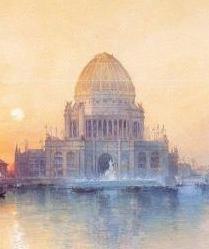
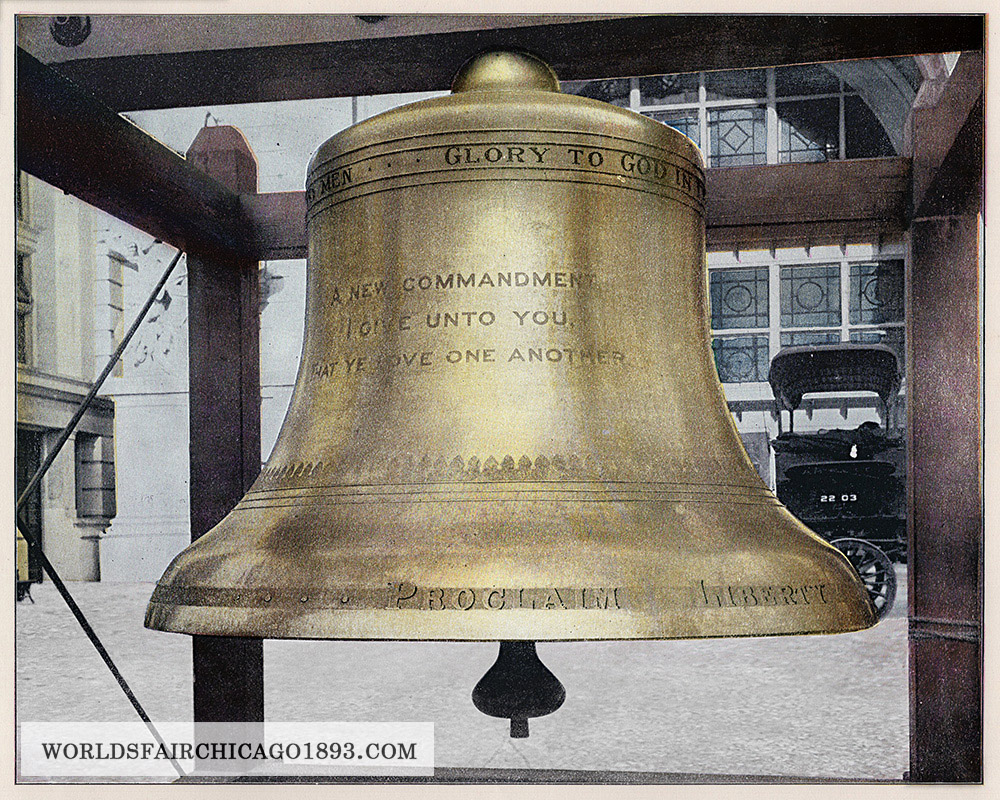
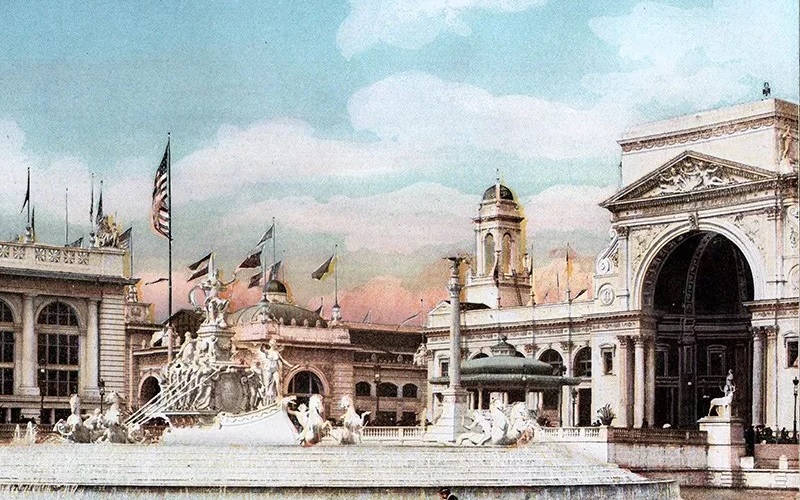
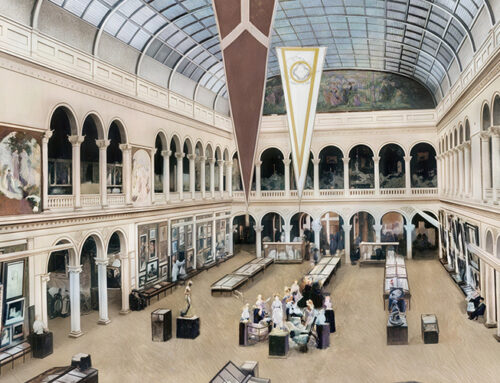
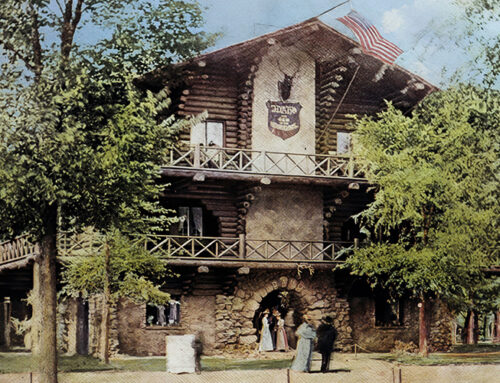
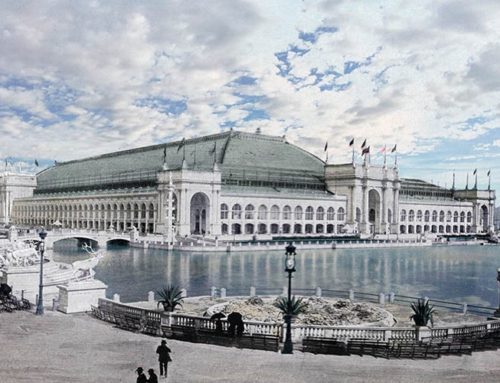
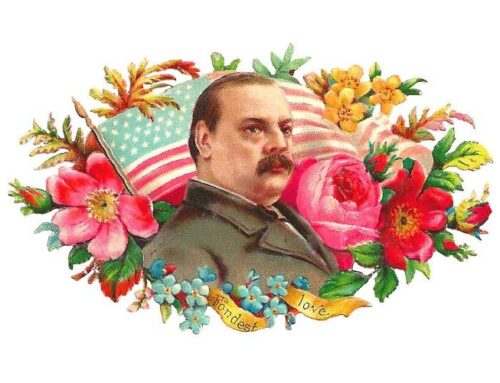
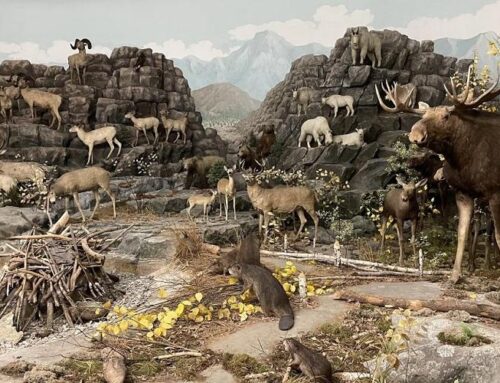
Leave A Comment